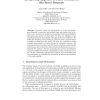Free Online Productivity Tools
i2Speak
i2Symbol
i2OCR
iTex2Img
iWeb2Print
iWeb2Shot
i2Type
iPdf2Split
iPdf2Merge
i2Bopomofo
i2Arabic
i2Style
i2Image
i2PDF
iLatex2Rtf
Sci2ools
108
click to vote
ISI
2006
Springer
2006
Springer
An Info-Gap Approach to Policy Selection for Bio-terror Response
Bio-terror events are accompanied by severe uncertainty: great disparity between the best available data and models, and the actual course of events. We model this uncertainty with non-probabilistic information-gap models of uncertainty. We focus on info-gaps in epidemiological models, in particular, info-gaps in the rate of infection. We define the robustness to uncertainty as a function of the required critical morbidity resulting from the attack. We show how preferences among available interventions are deduced from the robustness function. We demonstrate the irrevocable trade-off between robustness and demanded performance, and we show that best-estimated performance has zero robustness. We present a theorem concerning the reversal of preferences between available interventions, and illustrate it with a numerical example. We also consider the opportuneness inherent in the uncertainty and how preferences are formulated by attempting to enhance the possibility of favorable windfall.
Related Content
| Added | 13 Dec 2010 |
| Updated | 13 Dec 2010 |
| Type | Journal |
| Year | 2006 |
| Where | ISI |
| Authors | Anna Yoffe, Yakov Ben-Haim |
Comments (0)

